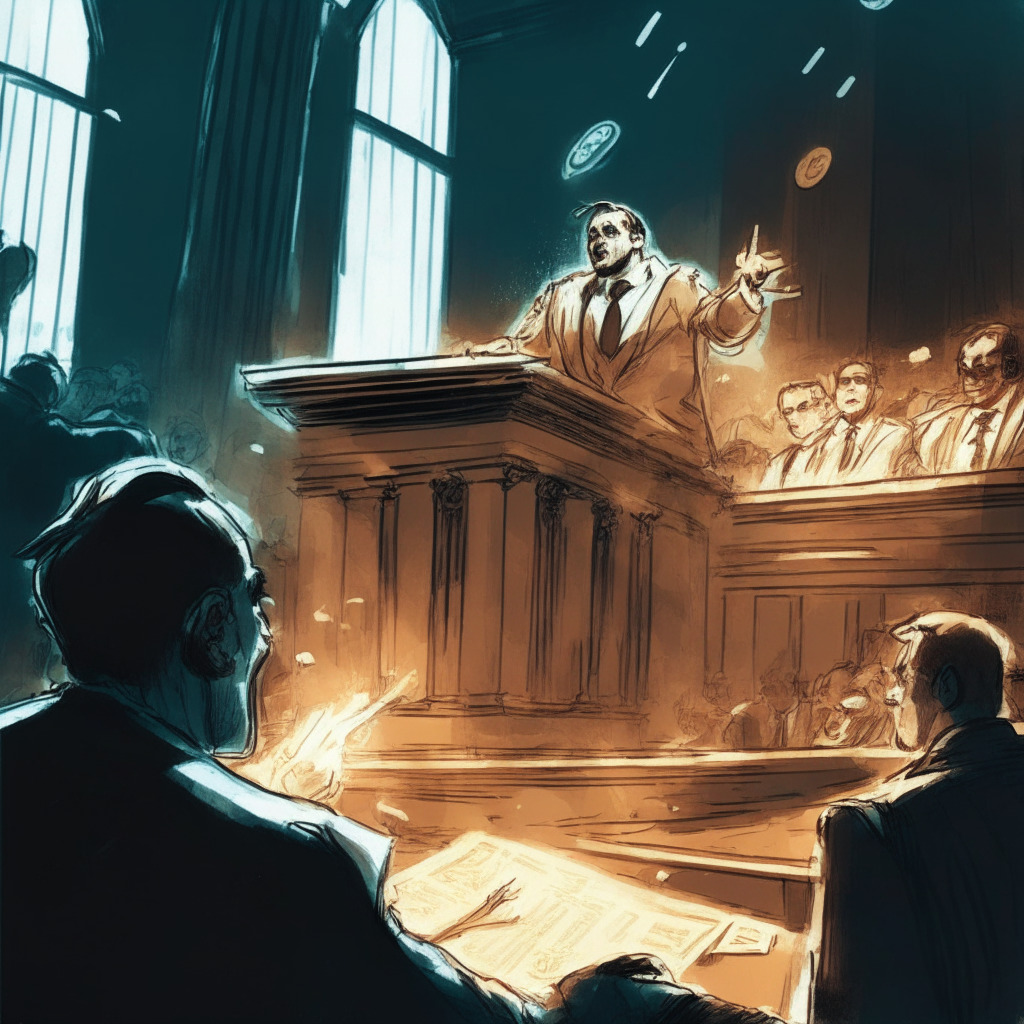A single entity recently purchased over 57,000 contracts of ether’s June expiry call option at a $2,200 strike price, selling an equal number of September expiry call contracts. This trade, involving large transactions outside the open market, represents a short call calendar spread strategy designed to profit from significant price shifts away from the strike price. The investor likely expects ether prices or volatility to rise after the June expiry.
Search Results for: RSI
Ledger’s Firmware Fiasco: Trust, Transparency, and the Push for Open-Source Crypto Wallets
Hardware wallets play a pivotal role in securing private keys and ensuring the safe storage of valuable digital assets. Recent concerns about Ledger’s controversial firmware update led competitor GridPlus to announce open-sourcing its firmware, promoting transparency and urging other manufacturers to follow suit. The debate highlights the importance of striking a balance between privacy, security, and trust in the cryptocurrency industry.
South Korea’s Urgent Crypto Bill: Balancing Investor Protection and Innovation
South Korea’s lawmakers are expediting the nation’s first standalone crypto bill, the Virtual Asset User Protection Bill, aiming to improve investor safety amid recent digital asset-related controversies. The comprehensive legislation consolidates 19 different crypto-related bills, providing clear legal definitions, outlining penalties, and mandating increased oversight and insurance for digital asset firms.
SEC vs Grayscale: Is Filecoin a Security? Examining the Debate and Its Impact on Crypto
The SEC now considers Filecoin’s native token, FIL, to be a security, resulting in Grayscale Investments challenging the regulator’s viewpoint. Amid increasing regulatory crackdown on crypto products, this decision raises questions about the extent of oversight in the industry and the balance between innovation and protection.
dYdX’s Decentralization Journey: Balancing Governance & Efficiency with subDAOs
dYdX, a decentralized platform known for perpetual contracts, is exploring the establishment of additional subDAOs to further decentralize its ecosystem management. As dYdX upgrades to its fourth version on the Cosmos blockchain, it aims to create a more inclusive governance model by allowing the wider community to actively participate in decision-making, potentially setting a precedent for decentralized trading platforms.
Crypto Wallet Wars: Ledger Recover Controversy and Competitors Capitalizing on Privacy Fears
Ledger faced backlash after introducing Ledger Recover, raising concerns about closed-source firmware and data leaks. Competitors Blockstream, Trezor, Cold Card, and BitBox slashed prices, emphasizing privacy and self-custody. The situation highlights trust, privacy, and user preference when choosing crypto wallets.
Bitcoin Smart Contracts: Revolutionizing Crypto or Crippling the Network?
Cryptocurrency developer Punk3700 launched the claimed first Bitcoin-based smart contract, reigniting the debate between Bitcoin maximalists and those open to diverse blockchain technologies. Projects like metaverses and an Ethereum Virtual Machine for Bitcoin raise concerns about network congestion and higher transaction fees, potentially discouraging users in developing countries.
Stablecoin Regulation Debate: Balancing Innovation, Dollar Dominance, and Securities Frameworks
The House Financial Services Committee’s Subcommittee is working towards regulating payment stablecoins, emphasizing the importance of dollar dominance and financial inclusion. While the SEC suggests regulating stablecoins through a securities framework, there is strong bipartisan consensus to treat them as cash instruments, with draft bills proposing prudential frameworks including capital requirements, redemption timeframes, and AML/KYC compliance.
SEC Deems Filecoin a Security: Crypto Community Divided on Market Impact and Innovation
The US SEC has determined that Filecoin (FIL) is a security, triggering a potential debate within the crypto community regarding classification and regulatory status. As authorities continue to scrutinize digital assets, it’s vital for market participants to stay vigilant and find a balance between fostering innovation and ensuring investor protection.
U.S. States Battle Over CBDCs: Privacy Fears, Rising Tension, and a Divided Future
Florida recently banned central bank digital currencies (CBDCs), sparking interest from states such as Louisiana, Alabama, Texas, and North Dakota who also drafted opposition bills. Privacy concerns, government control, and individual freedom are key factors contributing to the contentious debate on CBDCs in the US.
Unioverse: Revolutionizing Blockchain Gaming or Exposing Security Risks?
The Unioverse franchise by Random Games introduces Reyu, the first playable character NFT, in their innovative blockchain gaming development. Combining engaging visual illustrations, a captivating mini-game called “The Proving Grounds,” and immersive gameplay, Unioverse aims to revolutionize the gaming industry while fostering blockchain technology adoption and growth.
Ethereum’s Block Finality Crisis: Uncovering Security Gaps and Ensuring Future Stability
The Ethereum blockchain experienced a temporary loss of block finality last week, raising concerns about its functionality and security. The cause remains under investigation, with potential consequences including security issues like reorgs. Incidents have exposed areas for improvement in creating a more resilient Ethereum network, emphasizing the importance of finality for blockchain stability.
South Korea PM Pushes for Crypto Asset Disclosure by Public Officials: Opportunities and Risks
South Korean Prime Minister Han Deok-soo calls for high-ranking public officials to disclose and register cryptocurrency assets. Emphasizing the need for crypto asset inclusion in property registration, the push aligns with existing requirements for valuable assets like precious metals.
Optional Wallet Recovery Feature: Ledger Addresses Community Concerns & Skepticism
Ledger’s CTO, Charles Guillemet, addresses community concerns over the wallet recovery feature, emphasizing it as an entirely optional choice for users. Despite skepticism, Guillemet reassures that neither Ledger nor trusted providers can access user secrets or passphrases.
Uniswap’s Integration with Moonbeam: Benefits and Challenges for the Decentralized Exchange
Uniswap crypto exchange is set to become available on Moonbeam, a Polkadot parachain, following a proposal by Blockchain at Michigan. The integration aims to increase volume and liquidity, offering benefits in terms of speed, security, and interoperability to Uniswap users, essential for the exchange’s continued growth and success.
Stablecoin Regulation: Balancing Innovation and Consumer Protection in the US Market
California Rep. Maxine Waters has introduced a draft bill to regulate stablecoins in the United States, focusing on payment stablecoin issuers’ requirements, digital dollar research, and related subjects. Supporters say a clear regulatory framework would ensure oversight and consumer protection, while critics argue it could hinder innovation and limit the broader adoption of cryptocurrencies.
HT Token Controversy: Analyzing Justin Sun’s Accusations and the Impact on the Crypto Market
Justin Sun has accused Li Wei, brother of Huobi exchange founder Leon Li, of profiting illegally from HT token sales. The HT DAO governing the decentralized HT token plans to negotiate a refund and implement remedial action. Despite controversies, HT token trades at $2.90, while presales remain a high-risk-high-reward investment strategy.
Ripple Acquires Metaco: Boon for Crypto Custody or Integration Challenge?
Ripple acquires Swiss digital asset custodian and tokenization provider Metaco for $250 million, aiming to expand its enterprise services. With access to Ripple’s customer base and resources, Metaco’s growth is expected to accelerate as they target the booming institutional crypto custody market, predicted to reach $10 trillion by 2030.
US Secret Service Holds Crypto and NFTs: Illicit Funds Easier to Track Than Ever
The US Secret Service revealed they hold crypto and NFTs during a Reddit AMA, where they expressed fascination with cryptocurrency and blockchain. They claimed cryptocurrencies have made tracking illicit money flows easier and highlighted the “amazing opportunity” to better track criminal activity.
Solana’s Rise in Blockchain Gaming: Potential and Challenges Unraveled
The rise of blockchain-based gaming has captured the attention of gamers and developers, with Solana emerging as a groundbreaking contender. Solana’s high transaction speed and low fees offer seamless gaming experiences, but concerns persist over consensus algorithm and security measures.
Solana’s Surge in Users: Impact on Crypto Markets, Alternatives & Investment Strategies
Solana network has seen a spike in daily users due to its high transaction throughput and low gas fees, reaching almost 400,000 active users. As Bitcoin and Ethereum face congestion, lower-cost alternatives like Solana prove viable, suggesting strong potential for medium-term growth. Diversifying investments and exploring high-risk-high-reward options, such as crypto presales, is crucial for sustained success in the evolving market.
Tether’s Bitcoin Investment Plans: Confidence in Growth or Transparency Issues?
Tether plans to allocate up to 15% of its net realized operating profits towards investing in Bitcoin, citing its resilience and growth potential. However, concerns over transparency and underlying assets backing stablecoins persist, with some critics questioning Tether’s $1.5 billion worth of Bitcoin reserves.
Ripple Acquires Metaco, Tether’s New Strategy, and the Latest in Crypto Markets and Regulations
Ripple acquires Swiss-based Metaco for $250 million, expanding enterprise offerings and accelerating Metaco’s growth. Tether announces 15% net realized operating profits to be allocated towards Bitcoin purchase for reserve diversification. Meanwhile, Coinbase expands services in Singapore and China issues guidelines for NFT treatment.
Dogecoin’s Uncertain Future: Falling Wedge Pattern Sparks Debate on Bullish Recovery vs. Bearish Reversal
Amid market choppiness, Dogecoin’s price remains stagnant, showing uncertainty with short-body candles on the daily chart. A falling wedge pattern suggests a possible correction phase, but a bullish recovery could emerge if it breaks the overhead trendline. Nevertheless, high market volatility requires exercising caution before investing.
Hinman Documents Decision: Unveiling the Future of Digital Assets Regulation
The U.S. District Court’s recent decision on the Hinman documents marks a potential turning point for the global crypto industry regarding the characterization of digital assets. This high-profile Ripple Labs case could influence future regulatory decisions and either usher in a new era of regulatory clarity and innovation or create a stifling regulatory environment, affecting the growth potential of the crypto industry.
Tether’s 15% Bitcoin Investment: Pros, Cons, and Future of Stablecoin Regulation
Tether plans to invest 15% of its net profits in Bitcoin to strengthen and diversify its reserves, demonstrating the company’s confidence in the cryptocurrency market. As US lawmakers discuss potential stablecoin legislation, Tether’s bold move could potentially shape the future of the industry.
Ledger Live Expands: Cosmos Integration, Staking, and the Scalability Conundrum
In a recent announcement, Ledger Live has added compatibility for Cosmos, a rapidly growing blockchain ecosystem. This update enables users to send, receive, and stake Cosmos’ native ATOM token and supports other Cosmos-based projects. Ledger’s CTO Charles Guillemet highlights Cosmos’ unique scalability tactics and bridging technology, making it a priority integration for the hardware wallet provider.
Shocking $15M Crypto Scam Exposed: How Phishing Operation Mimicked HitBTC Exchange
A scammer or group used a sophisticated phishing method to steal approximately $15 million in cryptocurrency on a fake HitBTC exchange platform. The fake website gained unauthorized access to users’ holdings, compromising their assets. It is crucial to verify the browser’s URL to combat such attacks.
Airstack Raises $7M: Revolutionizing Web3 with Natural Language AI or Ethical Dilemma?
Web3 developer platform Airstack raises $7 million in pre-seed funding, enabling developers to access cross-chain data through AI-supported natural language requests. The platform addresses developer pain points and has attracted over 200 developers since its April launch, with plans to onboard thousands more in the coming months.
Ripple vs SEC: Unsealed Documents Reignite Crypto Regulation Debate
Ripple achieved a significant victory in its legal battle with the US SEC regarding XRP’s status as a security. Central to the case is a 2018 speech by a former SEC director on Bitcoin and Ethereum’s classification. The recent ruling denying the SEC’s motion to seal documents tied to this speech has stirred up reactions and could foster better understanding around regulatory issues concerning cryptocurrencies.
Blockchain’s Role in Revolutionizing the Space Industry: Security, Trust, and Transparency
Blockchain technology can enhance the space industry by providing a secure, tamper-proof data communication network for spacecraft and satellites, protecting against cyberattacks, and increasing transparency for investors and partners in privatized space exploration missions. This improves security, trust, and efficiency in the burgeoning sector.
Uniswap V3 Deployment on Polkadot: Scalability Boost & DeFi Safety Debate
Uniswap plans to deploy its V3 iteration on Polkadot, offering enhanced capital efficiency, flexible fee structures, and an improved user experience. This move highlights the growing popularity of decentralized exchanges, with Uniswap V3 capturing over 50% of monthly DEX market share.































